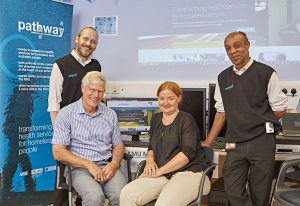
Pathway has introduced the first dedicated digital health-screening template to help health services supporting homeless people.
Following two years of development with EMIS Health, the template is now available free of charge to organisations using the EMIS Web clinical system. It was supported by 11 specialist homeless healthcare services for use by 200 staff.
Developers aim to roll the template out across the UK, and hopes it will ultimately relieve pressure on hard-pressed hospital departments.
The template enables doctors and health workers to create and maintain a detailed picture of a homeless person’s health, capturing vital information including clinical history, mental health and addiction issues, as well as details on housing and financial status. The template utilises national clinical coding and is ‘SNOMED CT ready’.
In the past hospitals were using different codes and record systems, resulting in inconsistent record-keeping, that meant some homeless people were not receiving the best treatment.
Samantha Dorney-Smith, Pathway Nursing Fellow, pictured here with members of Pathway teams, has been shortlisted for a Nursing Times award for her work leading the project. She said:
“Homeless people are five times more likely to attend A&E and four times more likely to be admitted to hospital than the housed population. The template will enable doctors to see patients’ health priorities, provide more effective treatment and help relieve pressure on the NHS by reducing bed days and treatment costs”
She says it will also enable the NHS to accurately track and analyse illness and infection rates amongst the homeless population: “The template will make it much easier to commission large-scale health services, treating patients who are homeless more effectively, economically and on a much larger scale. It has the potential to be a real game changer.”
Mo became homeless after being seriously injured in an accident. A year on, he is safely housed and helped Pathway with developing the template. He said:
“Comorbidities hurt patients and cost the NHS a great deal of money, so it’s important that we capture and use data in ways that really help people. Having my health record follow me would have made diagnosis and treatment quicker, and it probably would have saved the NHS money too.”
Dr Shaun O’Hanlon, Chief Medical Officer at EMIS Group said:
“We have a long-standing relationship with Pathway and were pleased to offer our expertise free of charge to help create this vital template. With homeless people statistically 10 times more likely to die early than the rest of the population, there is a real need for this vulnerable group to receive specialist help, and this template will assist clinicians in driving up standards of care.”